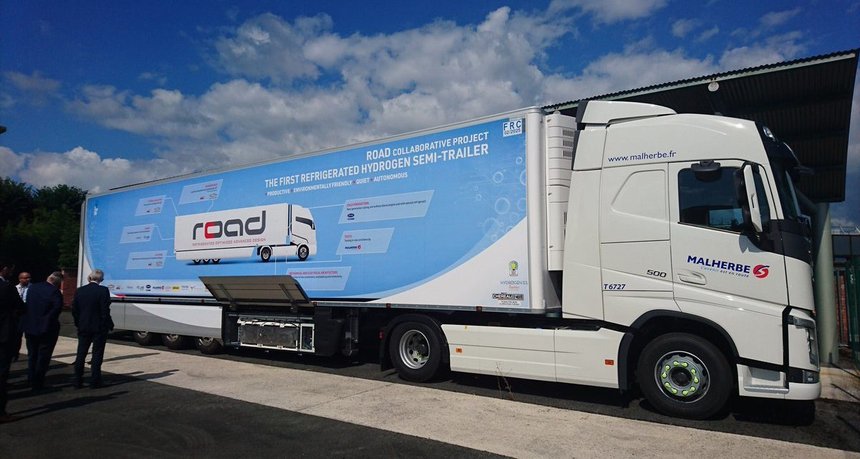Two French projects, ROAD and FresH2, aim to replace the diesel engines of semi-refrigeration units with hydrogen fuel cells and suitable refrigeration units. Objective: decarbonize refrigerated transport. To achieve this with these semi-trailers, two French bodybuilders, Chéreau and Lamberet, are leading ambitious programs based on hydrogen fuel cells (PAC). The aim is to supply electricity to cold units, independently of the tractor engine.
Switching refrigerated semi-trailers to all-electric technology requires charging installations with high-capacity sockets,” says Jean-Pascal Vielfaure, general manager for France and Southern Europe at Carrier Transicold, which supplies refrigeration units. This presupposes access to abundant electricity, which is not always the case. Hence the interest in hydrogen-powered electric trailer solutions.” It was Chéreau who took the first shot by presenting, in 2019, at the Solutrans ROAD show, the first trailer in the world operating with three PACs of 3.5kW. The result of an investment of 3.3 million euros in R&D partly financed by the State and the Normandy Region, its operational prototype thus demonstrates that the habits of the transporter, in this case the Malherbe transporter, change relatively little.
The Norman bodybuilder has surrounded itself with Carrier Transicold (refrigeration unit) and FC LAB, a research unit at the University of Burgundy-Franche-Comté, specializing in heat pumps. “The hydrogen tanks are installed in the chassis between the side members and the heat pump system housed below the wheelbase. The vehicles are designed for at least two days of long-distance autonomy, and one day in distribution,” assures Christophe Danton, marketing and communications director of Chéreau, a group based in Ducey (50) which employs 1,000 employees. . “Next spring, we will launch two new pre-series hydrogen semi-trailers, as part of the “Vallée hydrogen Grand Ouest” project, equipped with a single 30 kW heat pump which will be operated by Delanchy and STEF</ em>,” confides Christophe Danton.
A silent device
For its part, the FresH2 project, initiated at the end of 2019 as part of the Future Investment Program (PIA), mobilized Bosch for the hydrogen heat pump with a power of 20 kW and Carrier Transicold for the Vector HE 19 refrigeration unit. multi-temperature as well as the SR2 Heavy-Duty trailer from the bodybuilder Lamberet, and STEF, the temperature-controlled food transporter. The size of a pallet rack, the battery-free FresH2 device is located in the wheelbase of the trailer.
Entering the road testing phase in September 2021 in the Chambéry region (Savoie), FresH2 aims to develop its version of hydrogen semi-trailers intended for the transport of temperature-sensitive products. “The tests validated the proper functioning of the fuel cell associated with a cold unit. But the drivers appreciated this trailer because it is silent, continues Jean-Pascal Vielfaure of Carrier Transicold. This is important because 80% of temperature-controlled product deliveries are made between 10 p.m. and 6 a.m. »
For its part, Chéreau plans to industrialize its new products from 2025. The objective being to reach 20% to 25% of its production in the hydrogen niche within ten years. “Before moving on to the production phase, the tests must still continue,” estimates Christophe Danton. To move into series, we will need sufficient experience and a relevant view of the overall operating cost which, to date, is not yet competitive with diesel or battery electric.< /em> » Indeed, at more than 10 euros per kilogram, the price of green hydrogen remains expensive. “It should be lowered, agrees Jean-Pascal Vielfaur, to seven euros per kg. » At the same time, the carbon-free hydrogen distribution network should expand its network.
